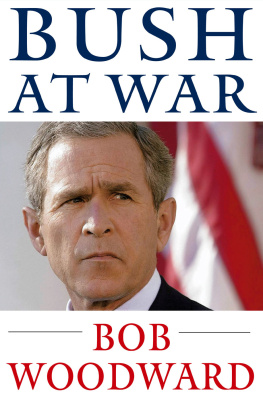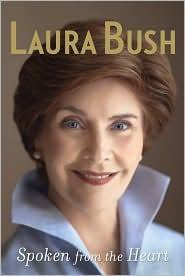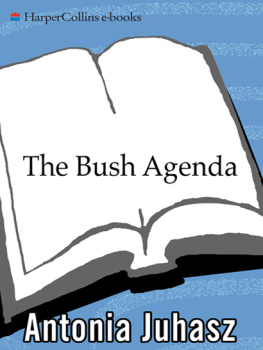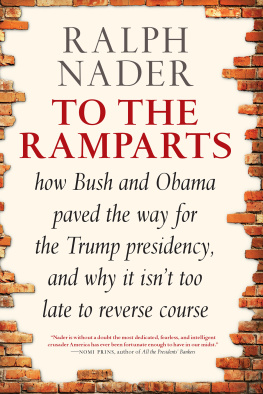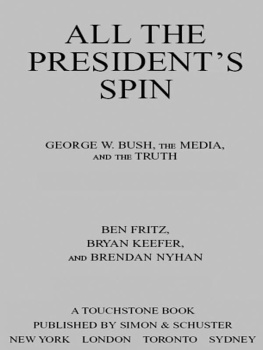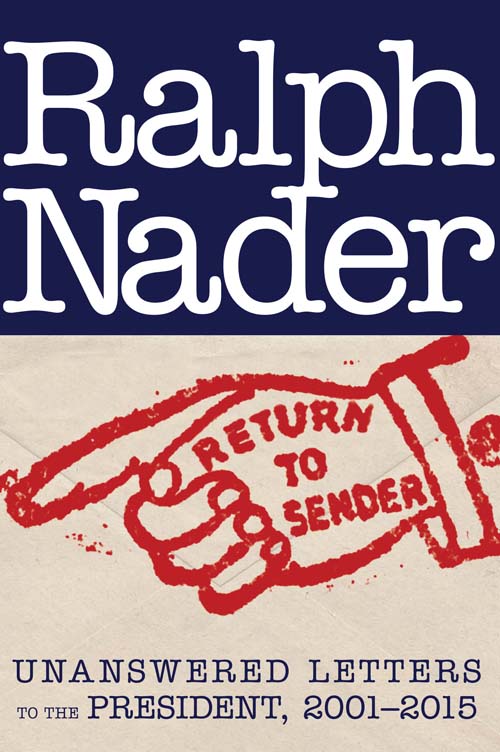RETURN
TO SENDER
Dedicated to the U.S. Postal Service, the people who make it work, and those citizens who have defended its critical role in thousands of communities throughout our countrys history, starting with Benjamin Franklin!
and
To thoughtful writers of letters to their elected representatives.
RETURN
TO SENDER
Unanswered Letters to the President 20012015
Ralph Nader
Seven Stories Press
New York Oakland
Copyright 2015 by Ralph Nader
A Seven Stories Press First Edition
All rights reserved. No part of this book may be reproduced, stored in a retrieval system, or transmitted in any form or by any means, including mechanical, electronic, photocopying, recording, or otherwise, without the prior written permission of the publisher.
Seven Stories Press
140 Watts Street
New York, NY 10013
www.sevenstories.com
College professors and high school and middle school teachers may order free examination copies of Seven Stories Press titles. To order, visit www.sevenstories.com/contact or send a fax on school letterhead to ( ) 226-1411 .
Book design by Jon Gilbert
Library of Congress Cataloging-in-Publication Data
Nader, Ralph.
Return to sender : unanswered letters to Presidents Bush & Obama, 2001-2015 / Ralph Nader. -- Seven Stories Press first edition.
pages cm
ISBN 978-1-60980-626-2 (hardcover)
1. United States--Politics and government--2001-2009--Sources. 2. United States--Politics and government--2009---Sources. 3. United States--Social policy--1993---Sources. 4. United States--Politics and government--Decision making--Sources. 5. Bush, George W. (George Walker), 1946---Correspondence. 6. Obama, Barack--Correspondence. 7. Presidents--United States--Correspondence. 8. American letters. I. Title.
E902.N34 2015
973.932092--dc23
2014038291
Printed in the United States of America
9 8 7 6 5 4 3 2 1
Contents
June 26, 2006: Response from the White House on Automotive Issues
October 9, 2001: Response from the White House About Tax Surplus
: Michelle: Stand Your Ground
on Childhood Nutrition
October 2, 2014: First Lady Michelle Obama Finds the Right Tone
July 17, 2012: The East Wing Responds
November 22, 2010: Imagining a Letter from Dubya
Introduction
As a teenager, I was enthralled by the letters between Thomas Jefferson and John Adams into their last years, and Justice Oliver Wendell Holmess correspondence with scholar Harold Laski. Many of the letters had a continuity of exchanged thoughts that added up to much more than the sum of their parts.
I have always preferred the ink-and-paper, written letter method of communicating with elected officials. This method proved fruitful in the heyday of consumer and environmental activism during the sixties and seventies when many such letters received media attention and subsequently sparked action. This book contains my letters to Presidents George W. Bush and Barack Obama, presented in reverse chronological order for each presidency.
The letters in this volume recount missed opportunities by presidents who increasingly are being preoccupied with fundraising trips, avoidable foreign wars and hostilities, and ceremonial photo opportunities interspersed with White House gatherings with sports stars and other celebrities of the moment. Since taking office in 2009, President Obama has attended over 425 fundraisers with the rich all over the country. Sadly, besides draining time away from substantive presidential engagements, these events are antithetical to serious civic and political discourse, and destructive to what Abraham Lincoln called the public sentiment. They are just fancy auctions between candidates and friendly affluent bidders, whose presence cues the former about what is expected in return. Given how presidents spend their time, it is fair to say that they misspend much of their time with such pursuits.
Imagine the benefits to us all of a president who empowers the people by mobilizing them to form better, self-reliant communities, or who pays close attention to the neglected federal civil service and the improved running of executive departments and agencies.
I harbor the hope that sparing some attention for thoughtful letters would provide presidents with periods of reflection and help them escape from their tightly programmed schedules. Reading serious letters sent by citizens might induce presidents to send out thoughtful responses in the form of public feelers for fresh approaches, recommendations, or timely alerts about important matters. Additionally, reading and responding to these letters would set an example that would encourage others to share their valued thoughts and break down the barrier of communication between the White House and the citizenry. How else can citizens ever hope to communicate with their president on anything other than a symbolic level? Inaugurating a new tradition of presidential replies can enrich deliberative democracy by bringing forth otherwise inhibited feedback from people of experience, wisdom and imagination whose voices otherwise arent heard from.
I hope readers will find a concrete example by one citizen in what follows and be encouraged to follow suit.
Rhetoric by both Presidents George W. Bush and Barack Obama would have you think that these presidents encourage and support citizens sharing their opinions with their commander in chief. However, once delivered to the White House, my letters to Presidents George W. Bush and Barack Obama could not penetrate the multi-layered White House bubble. What happens to them upon arriving at 1600 Pennsylvania Avenue is a mystery. I have no idea if anyone reads them, refers them to other departments and agencies in the executive branch, or puts them in circular files or warehouses for the archives or presidential libraries. With very few exceptions, I received no response from anyone on staff, nor even an acknowledgement of receipt. Many others have had similar experiences, including, at a critical time for our country, the leaders of more than thirteen diverse national organizations with millions of members such as the National Council of Churches and national labor, veteran, women, student and business groups. Each organization independently requested an urgent meeting with the single-minded President Bush shortly before his invasion of Iraq in 2003. Not one received even the courtesy of an acknowledgement (see: https://nader.org/iraq-letters).
Occasionally, letters from average citizens surface when a president wants to use them for political spin. Or presidents will mention their interest in citizens pleas, as President Obama does when he mentions that he reads ten letters from the people before sleeping every night, to take him out of his self-imposed bubble.
As I am involved in many issues and citizen groups, I frequently wrote to these presidents and hoped for some reaction from them or even from an assistant. In order to avoid redundancy, I restricted those epistles to viewpoints not often made and to taboos not often discussed. For example, I sent letters discussing Israels devastation of Lebanon and Gaza while receiving, with knee-jerk predictability, military, economic and diplomatic support from Washington contrary to federal law and international treaties.
Breaking through this communication bubble using other portals is nearly impossible. The bubble controls the quality and quantity of presidential news conferences as well as who is called on among the White House Press Corps, and therefore shapes the resulting headlines.
This disturbing trend of nonresponse and discourtesy to citizens extends to many cabinet secretaries and agency heads. It is in the self-interest of these federal officials to give the perception of listening to their constituents by, at the very least, acknowledging receipt of their letters and e-mails. Yet, it seems that like presidents, cabinet secretaries and agency heads largely treat paper letters with indifference, as the Securities and Exchange Commission (SEC) did to knowledgeable writers who for several years repeatedly conveyed in letters to the SEC the essence of the Madoff scandal. All this spells the degradation of an elementary relationship between the citizens and their elected officials and those agency heads appointed by elected officials.


